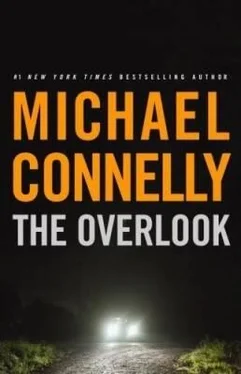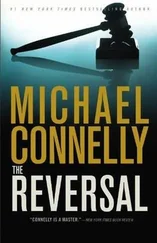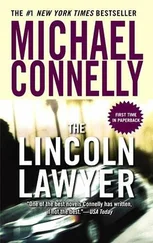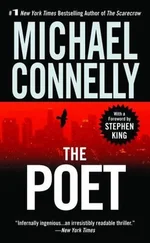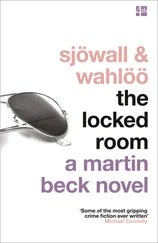Bosch nodded. It was a possibility.
“You holding him on the trespass?” he asked.
“Yeah. I talked to the guy who bought the place from Madonna and he’ll work with us. He’ll press charges if we need him to. So don’t worry, we can hold him and work him with it.”
“Good. Take him downtown, put him in a room and warm him up.”
“You got it, Harry.”
“And Ignacio, don’t tell anybody about the cesium.”
“Right. I won’t.”
Bosch closed the phone before Ferras could tell him to call him Iggy again. He listened to the end of Brenner’s conversation. It was obvious that he wasn’t talking to Walling. His manner and tone of voice was deferential. He was talking to a boss.
“According to the log here, seven o’clock,” he said. “That puts the transfer at the overlook at around eight, so we’re talking about a six-and-a-half-hour lead at this point.”
Brenner listened some and then started to speak several times but was repeatedly cut off by the person on the other end of the line.
“Yes, sir,” he finally said. “Yes, sir. We’re on our way back in now.”
He closed the phone and looked at Bosch.
“I’m going back in on the chopper. I have to lead a teleconference debriefing with Washington. I’d take you with me but I think you’d be better off on the ground, chasing the case. I’ll have someone pick up my car later.”
“No problem.”
“Did your partner come up with a witness? Is that what I heard?”
Bosch had to wonder how Brenner had picked that up while conducting his own phone conversation.
“Maybe, but it sounds like a long shot. I’m going downtown to see about that right now.”
Brenner nodded solemnly, then handed Bosch a business card.
“If you get anything, give me a call. All my information is on that. Anything at all, call.”
Bosch took the card and put it in his pocket. He and the agents then left the lab and a few minutes later he watched the federal chopper take off into the black sky. He got in his car and pulled out of the clinic’s parking lot to head south. Before hitting the freeway he gassed up at a station on San Fernando Road.
Traffic coming down into the center of the city was light and he cruised at a steady eighty. He turned the stereo on and picked a CD from the center console without looking at what it was. Five notes into the first song he knew it was a Japanese import from bassist Ron Carter. It was good driving music and he turned it up.
The music helped Bosch smooth out his thoughts. He realized the case was shifting. The feds, at least, were chasing the missing cesium instead of the killers. There was a subtle difference there that Bosch thought was important. He knew that he needed to keep his focus on the overlook and not lose sight at any time of the fact that this was a murder investigation.
“Find the killers, you find the cesium,” he said out loud.
When he got downtown he took the Los Angeles Street exit and parked in the front lot at police headquarters. At this hour nobody would care that he wasn’t a VIP or a member of command staff.
Parker Center was on its last legs. For nearly a decade a new police headquarters had been approved for construction but because of repeated budgetary and political delays the project had only inched toward realization. In the meantime, little had been done to keep the current headquarters from sliding into decrepitude. Now the new building was under way but it was an estimated four years from completion. Many who worked in Parker Center wondered if it could last that long.
The RHD squad room on the third floor was deserted when Bosch got there. He opened his cell phone and called his partner.
“Where are you?”
“Hey, Harry. I’m at SID. I’m getting what I can so I can start putting the murder book together. Are you in the office?”
“I just got here. Where’d you put the wit?”
“I’ve got him cooking in room two. You want to start with him?”
“Might be good to hit him with somebody he hasn’t seen before. Somebody older.”
It was a delicate suggestion. The potential witness was Ferras’s find. Bosch wouldn’t move in on him without his partner’s at least tacit approval. But the situation dictated that someone with Bosch’s experience would be better conducting such an important interview.
“Have at him, Harry. When I get back I’ll watch in the media room. If you need me to come in, just give me the signal.”
“Right.”
“I made fresh coffee in the captain’s office if you want it.”
“Good. I need it. But first tell me about the witness.”
“His name is Jesse Mitford. From Halifax. He’s kind of a drifter. He told me he hitchhiked down here and has been staying in shelters and sometimes up in the hills-when it’s warm enough. That’s about it.”
It was pretty thin but it was a start.
“Maybe he was going to sleep up there in Madonna’s courtyard. That’s why he didn’t split.”
“I didn’t think about that, Harry. You might be right.”
“I’ll be sure to ask him.”
Bosch ended the call, got his coffee mug out of his desk drawer and headed to the RHD captain’s office. There was an anteroom where the secretary’s desk was located as well as a table with a coffeemaker. The smell of fresh-brewed coffee hit Bosch as he entered and that alone almost gave him the caffeine charge he needed. He poured a cup, dropped a buck in the basket and then headed back to his desk.
The squad room was designed with long rows of facing desks so that partners sat across from each other. The design afforded no personal or professional privacy. Most of the other detective bureaus in the city had gone to cubicles with sound and privacy walls but at Parker Center no money was spent on improvements because of the impending demolition.
Since Bosch and Ferras were the newest additions to the squad their desk tandem was located at the end of a line in a windowless corner where the air circulation was bad and they would be furthest from the exit in the case of an emergency like an earthquake.
Bosch’s work space was neat and clean, just as he had left it. He noticed a backpack and a plastic evidence bag on his partner’s desk across from him. He reached over and grabbed the backpack first. He opened it and found it contained mostly clothing and other personal items belonging to the potential witness. There was a book called The Stand by Stephen King and a bag with toothpaste and a toothbrush in it. It all amounted to the meager belongings of a meager existence.
He returned the backpack and reached across for the evidence bag next. It contained a small amount of U.S. currency, a set of keys, a thin wallet and a Canadian passport. It also contained a folded “Homes of the Stars” map that Bosch knew was the kind sold on street corners all around Hollywood. He unfolded it and located the overlook off Mulholland Drive above Lake Hollywood. Just to the left of the location there was a black star with the number 23 in it. It had been circled with an ink pen. He checked the map’s index, and star number 23 said, Madonna’s Hollywood Home .
The map had obviously not been updated with Madonna’s movements and Bosch suspected that few of the star locations and their attendant celebrity listings were accurate. This explained why Jesse Mitford had been stalking a house where Madonna no longer lived.
Bosch refolded the map, put all the property back in the evidence bag and returned it to his partner’s desk. He then got a legal pad and a rights waiver out of a drawer and stood up to go to interview room 2, which was located in a hallway off the back of the squad room.
Jesse Mitford looked younger than his years. He had curly, dark hair and ivory-white skin. He had a stubble of chin hair that looked like it might have taken him his whole life to grow. He had silver rings piercing one nostril and one eyebrow. He looked alert and scared. He was seated at a small table in the small interview room. The room smelled of body odor. Mitford was sweating, which of course was the object. Bosch had checked the thermostat in the hallway before coming in. Ferras had set the temperature in the interview room to eighty-two.
Читать дальше
